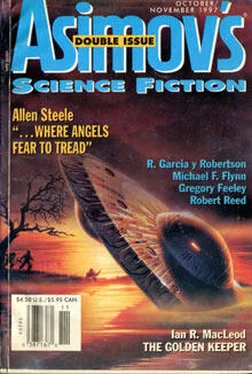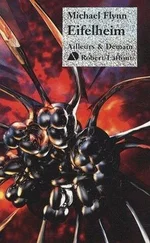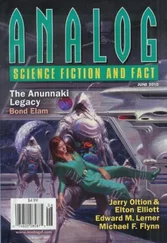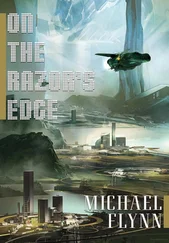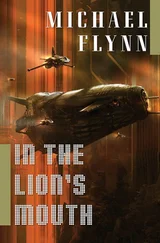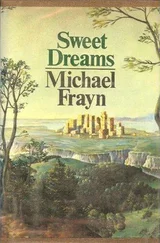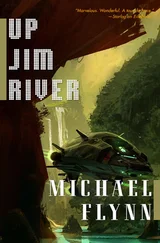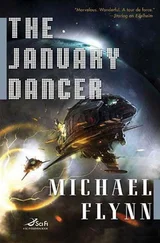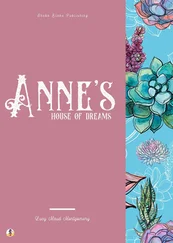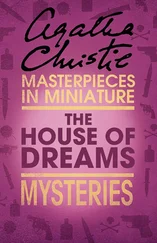Handgrips all around, and the party left swiftly, slipping out the door. The man—her husband?—was last. He and the woman touched each other briefly on the cheek; then she was alone. She threw home the big bolt on the kitchen door and, turning, placed her back to the door. After a moment, she strode away, brushing at her eye with the back of her hand. The gesture left a smudge on her cheek.
Ted wondered how she expected the man to get back inside with that big, honking bolt on the door.
Ted made his way to the front of the house, where he scanned the parlor with his ghostlight. A piano stood near the window. Maybe it was a harpsichord. This view was dimmer than the others. The woman, a half-seen wraith, clad in a lightweight two-piece dress of summery fabric, sat at the keyboard. The two children sang. (Well, their mouths were open. Call it what you want.) In a chair on the other side of the room, the man watched with a contented smile while he read a newspaper. A happier scene; an older one, perhaps—which might account for its dimness. The man spoke. The woman looked up from the keyboard, and he pointed to something in the paper. But the woman frowned and shook her head, nodding toward the children.
Ted winced, toggled the light—and now the parlor was deserted and the windows boarded up. Of the harpsichord and the singing children, there was no sign. Whatever music had filled this room was long faded. Suddenly, Ted bolted for the front door. Maybe he felt the walls closing in on him. Maybe those glimpses were stuffing him up like a Christmas goose and he needed to get away so he could think.
Outside, night had fallen badly. It always did in that part of town. It lay here and there in scattered pools, in the corners of houses, behind bushes, in the black slashes that were the shadows of light poles. Shattered and broken by triumphant streetlamps and houselights. To the right, behind the tract houses, a dome of light marked downtown. To the left, two blocks away but hidden by the trees, the strip mall created a wall of iridescent neon. There are places in the world where night never truly falls, outside the heart.
What chance did the ghostlight have? When Ted played it about the porch, when he aimed it at the old mansions on either side of Pennyworth House, when he tried for the tract houses on the far side of the road, the best he could elicit was the faint hint of a double image.
Bushes lined the porch. Ted went to the rail and leaned on it, watching the leaves rustle in the wind, listening to the voices of the breeze. Maybe he was thinking of the woman, naked and weeping beside him in the bed. Her breasts, soft and erect; her legs spread in welcome; her lips hungry and parted; her fingers playing the lover. Or maybe he was thinking only of his own inability to touch her, to console her. Perhaps he gave her a name, then. Who can say? It was probably not our name, not Sweet Betsy; but any name will do. Names make us human.
She was a ghost, and she haunted the house like a forgotten dream. There might be a plausible scientific rationale. Given parallel universes, you can explain anything. But she was a ghost. That was the nub of it.
And yet, she wasn’t just a ghost. Somehow, Ted’s curiosity had shifted gears. It no longer focused on paraphotons, but on what had happened or would happen or might happen to Sweet Betsy. What tragedy was playing out in those brief, disconnected glimpses? Hey, if a little bit of crossdimensional pud-knocking is what it takes to make a connection, who are we to frown disapproval? Betsy had been a phantom; now she was a person.
He stood there for a long time, listening to the whispering bushes. What they told him, only Ted knows.
In the end, and almost as an afterthought, he aimed the ghostlight onto the dark recess between the shivering bushes and the porch. Dirt, twigs, leaves, the detritus of a dozen years of weather and wind. Flowers, blooming and trampled. Footprints with drag marks between them. Odd prints, as if someone barefoot walked tippy-toe. The tracks led toward the right, and he followed them around the last bush, out of the blackness into the paler shadow of the great hickory in the front yard. The bush shook—but was it a breeze? Ted walked to the corner of the porch to get a better angle.
Someone crouched there. A woman? The long, flowing hair said so. The flare of the hips cried it out. But the hair was matted and tangled and full of burrs; and the grimy skin was a tattoo of scars and scratches and cicatrices. She crouched over something small and still. Ted’s hand trembled. Was this Sweet Betsy in some final, degraded, feral moment? Somehow he couldn’t believe that. He aimed the light straight at the crouching figure.
The woman turned and shielded her eyes with both arms. Oh, yes, it was a woman, all right—or at least, a female. The breasts were small and tight, but there was no mistaking the mat of fur at her groin. Ted lowered the flashlight a fraction of an inch, and the woman dropped her arms and snarled. Her eyes glowed like charcoal in the penumbra of the light. Incongruously, she seemed to have long, painted nails. As well expect lipstick as nail care on such a creature! Ted stood dumbfounded for a fraction of a second and the creature leaped!
As it leaped, it seemed to move forward from its background, as if the universe had zoom control. Its arms arced and its nails raked the air. Ted turned that light off damn fast, I tell you! And he left it off the rest of the night. When he lay in bed, later, his eyes refused to close. Well, he’d been scared enough to wet his pants, and when was the last time that ever happened to you? The very fabric of space had bulged; and there might even be a claw mark or two on the walls of the universe.
What sort of talk is this? What sort of flimsy, gimcrack universe is it, if you can push its walls and stretch them and scratch them up? And what was that thing? Ted had only seen it for an instant, but it was a real Kodak moment, and he lay awake a long time trying to forget.
It had walked on the balls of feet grown so long that the heel had become a sort of second, backward-facing knee. Think of the leap you’d get from that compound leverage! (Think about it? You saw it. Why, you could spring from one universe to the next, if such a thing were possible.) A narrow torso, hairless except for the underarms and groin and a little shag on the lower legs. A browless head wreathed by a lion’s mane of hair. Those nails were claws, and it wasn’t nail polish that made them so dark, and it wasn’t lipstick around its mouth and dripping down its long canine teeth.
People, that creature was inhuman, but you could see the human in it. It was what humans might have been had the lion niche been empty. Or maybe it was what humans might yet become: a genetic experiment gone horribly wrong; or (even more horribly) right.
Call it Homo leonis. Call it a leaper. Call it any damn thing you please. Ted pondered how small children liked to play hide-and-seek. But some places you shouldn’t hide in, because something else may have hidden there first. Ted shivered through the night, though it was unseasonably warm for April.
The Goodwill truck came the next day, and Ted lost himself in the petty details of the loading. He took the three workers through the house, pointing out what he had flagged for them to take. Two burly men in sleeveless shirts, wearing back-support belts; one woman, short and chunky, who looked as if sheer determination could make up for lack of size. Maybe Ted took comfort from their presence. Strong, competent, full of good cheer, they carted everything down the front porch, over to the driveway, where they secured it in the van. (Though the woman placed the gasogene in the cab under the shotgun seat. Hey, why throw away a perfectly good gasogene?)
Читать дальше
